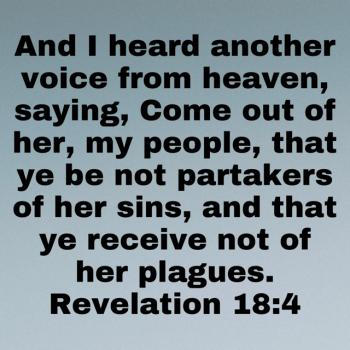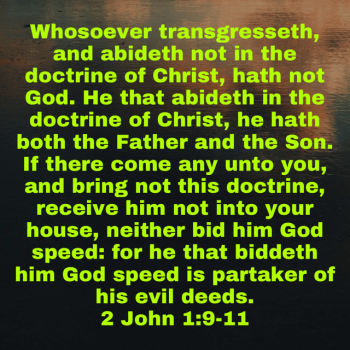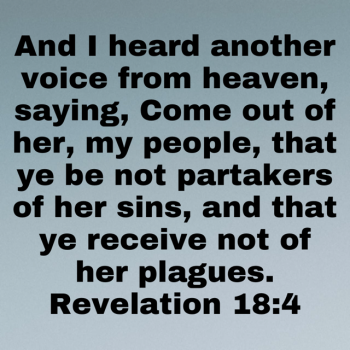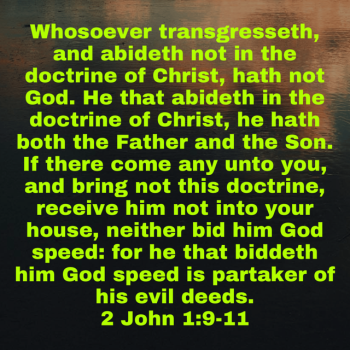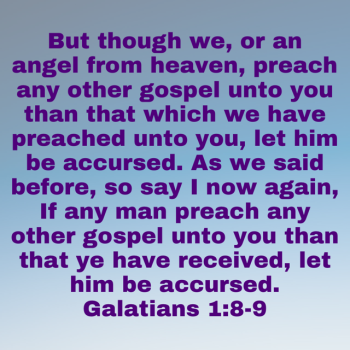I understand your concern. I was happy that the trinity was not allowed to be discussed here.
We must come to the conclusion that those that do not believe that Jesus is God, and thus do not believe
in the Trinity, really cannot be defined as Christians.
Indeed, and making newcomers qualify what they mean by Christian concerning the trinity, is obviously missing here.
Amen apart from your previous statement that the saved are taught by the Spirit on the trinity and therefore I say that logically cannot be saved if they teach otherwise.Not saying they're not saved....they probably are, and they're probably better than me...
what I'm saying is that Christianity was defined 2 thousand years ago and it should not be allowed to be changed.
So I'm with you 100%.
I don't think it will take a long time to understand fully what the Orthodox mean exactly when they differ on the trinity, which they indeed do. I already know what the western view is as I held to it. If we (the west) are getting it wrong, which is my point, we will not be able to withstand this attack that is coming, and already is. But thanks.Understand what you're doing...but I think explaining the Trinity to the best of our ability is really all that we need.
If you plan to study all of the variations, you'll be studying a long time...but I applaud you.
They did know, as can be seen in their Divine Liturgy (service) and by writings. Action had to step up later though to combat heresies and have agreement over a name for the doctrine.The Early Church Fathers were not present at Pentecost.
They were taught by the Apostles, or those that were taught by them.
They already were understanding and accepting that Jesus is God,,,this did not take 3 to 4 hundred years.
However, to properly explain the Trinity and have all the nations agree to the definition did take some time because of all the
heresies that had to be fought....like arianism which the Dr in the video spoke of.
Agreed that there is a mystery on how God and man could be joined. But here is plenty in the scriptures to tell us that, in the beginning, that is to say, at the point of creation, Jesus had come into being. Only the Father was eternal, before this age came into being, and from whom proceedeth the Son.Wonder what I said to make you think that??
But the answer is NO. I'm not saying you're not a trinitarian.
I think you're a concerned trinitarian...concerned for the doctrine.
I don't know that this is a growing trend.
Maybe I'm misinformed...
I'd go further than that and say that Jesus is a part of God.
I don't think the Trinity could really be understoood.
I had done a small study on this some years ago.
Have forgotten a lot.
My personal opinion is that the Holy Spirit proceeds from the Father.
Absolultely. If the Spirit proceeds from the Father, then He is equal to the Son, (but not the Father the source) but if He proceeds from the Son as well, then He is not equal. We can see that played out in the western church where the HS has not had the same attention.
and so little time!You?
Filioque (/ˌfɪliˈoʊkwi, -kweɪ/ FIL-ee-OH-kwee, -kway; Ecclesiastical Latin: [filiˈokwe]), a Latin term meaning "and from the Son", was added to the original Nicene Creed, and has been the subject of great controversy between Eastern and Western Christianity. The term refers to the Son, Jesus Christ, with the Father, as the one shared origin of the Holy Spirit. It is not in the original text of the Creed, attributed to the First Council of Constantinople (381), which says that the Holy Spirit proceeds "from the Father" (Greek: τὸ έκ του Πατρὸς έκπορευόμενον) without the addition "and the Son".[1]
In the late 6th century, some Latin Churches added the words "and from the Son" (Filioque) to the description of the procession of the Holy Spirit, in what many Eastern Orthodox Christians have at a later stage argued is a violation of Canon VII[2][full citation needed] of the Council of Ephesus, since the words were not included in the text by either the First Council of Nicaea or that of Constantinople.[3][full citation needed] The inclusion was incorporated into the liturgical practice of Rome in 1014, but was rejected by Eastern Christianity.
source: Filioque - Wikipedia
To get into it a little more:
CATHOLIC ENCYCLOPEDIA: Filioque
It expresses the Procession of the Holy Ghost from both Father and Son as one Principle; and, it was the occasion of the Greek schismwww.newadvent.org
So much to know...
Last edited:


